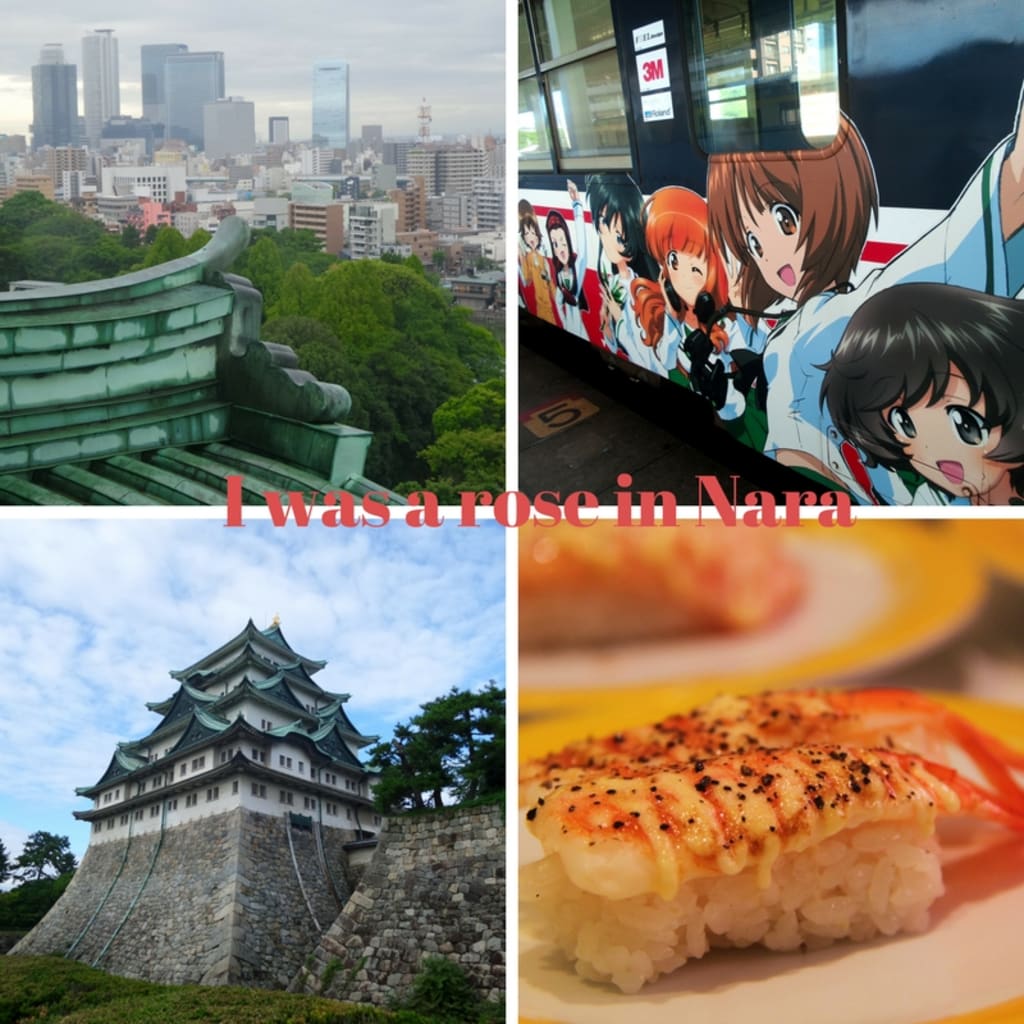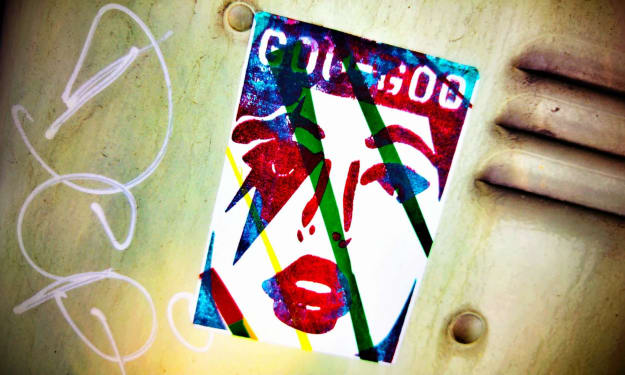A Rose in Nara
Traveling to Japan taught me a lot about my own family.

I was breathless.
Sitting next to Seini in the back seat of the Nakagawa family car, I saw Japan in a way my friends back home would never experience. We passed homes and businesses, bicyclists and walkers, business men and students. We were leaving Sakurai High School where our host sister Chinami attended. We were on our own, the rest of the group was on their way to their own host family.
In light of the constraints of their English, Chinami and her mother played American musicians to make up for the holes in our conversation. I pulled words from what I could remember from first year Japanese with Kamoshita sensei at Roosevelt, so I asked if they liked American food.
“Amerika no tabemono ga suki desu ka.”
“Hanbaagaa,” they chuckled.
“Oh, I like hamburgers too,” commented Seini. Like most of the others from Roosevelt and Grant who were on the trip, she was a sophomore. Her Japanese was as limited as our host family’s English, but we were all getting along fine.
“Am I the only one who still finds it weird to be in a car driving on the opposite side of the road?” I whispered to Seini, she nodded.
It was day four of the trip and Nara was proving to be so much more different than Tokyo and Kyoto. Nara wasn’t a very crowded, nor busy, prefecture. Once you leave the central city, rice fields and vegetable gardens become more and more abundant. I almost dropped my jaw and lost it forever when I saw the beautiful surrounding mountains coated with a luscious jungle. The green that topped the trees were nature’s true emeralds. The air felt so fresh, it was as if I was breathing with purified lungs. Despite the heat and humidity, I would call it paradise because I was in love.
We made a quick stop at the local supermarket where the words SUPER CENTER OKUWA loomed larger than life on its face. Inside, our eyes beheld purple octopus tentacles on clearance and a wide variety of orange flavored drinks — to my dismay, no Melon Fanta. The packaging of all the colorful products were written in bubble-letter katakana characters to catch the consumer’s eye. I made an idiot of myself without a care, I found everything I saw to be cute and worth pointing out, most especially the giggly babies wrapped in the arms of shopping mothers. Their chubby cheeks and toothless smiles made Seini and I coo like pigeons in the park.
Afterward, we finally made it to the Nakagawa home. Their house was nestled away behind a stone wall, adjacent to their vegetable garden. We parked and walked around the corner and down the alley. They pushed aside the wooden fence door and we entered the open courtyard. There was a little house just a few feet from theirs where the grandparents lived. Then Chinami slid open their front door where we took off our shoes as we entered.
Inside we were greeted by the father, the two sisters, and the grandparents. They were very welcoming. Their smiles and friendly laughter swallowed us. I felt my shyness melt away. I was very wide-eyed as they took us on a tour of their humble but beautiful home.
It was very unlike any home I had ever been in. The two leveled house was condensed, creaky, and a perfect mix of modern and traditional architectural features. There were sliding doors, and even a separate room with a shrine to honor ancestors. Their living room didn’t have a couch, just large pillows that cradled the sitter on the carpet. They owned a washer, but it was the norm in Japan to hang clothes to dry outside on a line due to the natural heat.
Up until then, I assumed most bathrooms were set up the same; a sink, a toilet, and usually a bath/shower. Their bathroom was different, at least in the terms of a sheltered westerner. It was divided, there was a cramped closet like room with the toilet that served as a bidet and had a morning seat warmer, then was a short hallway with the sink and washer (it also had a screen door leading out back), and then a personal space for the bath tub. But in that room, there was a drain in the center of the tiled floor. I found it to be odd and awkward to shower outside of the tub. In Japan, it is very common for the bathroom to be structured that way. The tub is where you would relax and soak after rinsing off. You don’t use soap or actually bathe in this tub. You would leave the water in there for the next soaker (who would be a family member, of course). Guests ideally do not use the bath, just simply shower. It was a nice contrast to the rushed-but-personal-this-is-me-time nature of showering in America.
That night, we sat before an incredible meal. The salad contained tomatoes, cucumbers, and spinach from their own garden. The miso soup and bowl of chicken had me mesmerized, even when I turned red from having a hard time grappling the concept of using chopsticks to eat rice. We sipped the sweetest orange juice from Winnie the Pooh glasses as we tasted for the first time omurice, an omelette over rice dish that was a country-wide favorite. Seini and I graciously thanked our host mother many times throughout the dinner; she must have been sore later from the constant smiling and nodding, but never did she bask in the glory like any American host undoubtedly would do with visitors. It is part of the Japanese culture to deny compliments with modesty and honest humbleness, even if they know it is true.
Later we gathered in the living room for omiyage and slightly awkward socializing. Omiyage is a gift you offer to friends and family from your travels, in our case it was gifts for our host family that represents where we came from. Omiyage can come in the form of coffee table books, magnets, coffee mugs, or school based lanyards. Treats and snacks are very popular. As long as it has meaning to you and says a lot about your home, it will be gratefully accepted. Seini brought University of Oregon gear for the Nakagawa adults; a fleece blanket for the elders and keychains for the parents. For the sisters, she had made friendship bracelets. After Seini was my turn. I was very nervous. I bowed as I offered my omiyage, a Portland snow globe and a book about our fair city that I not only was published in but had helped edit and construct. It meant a lot to me, though I felt silly for giving them a book that they couldn’t read completely, but their acceptance reassured me.
“I will study English better and read this, okay?” Smiled Naoni, who at the time was attending college in the city. We all sat down on the living room pillows to talk with the television on. Soon the awkward laughs between exchanges became genuine and light hearted. After watching Japanese reality TV, we slept on the floor of a different room on thinly padded mats.
All in all, it took Seini and I a while to adjust to the customs, but it soon felt like home.
In Japan, it is not unusual to refer to your host mother as okaasan. At first, I felt slightly silly about calling her mother, especially since I knew so little about her, but in time her kindness and generosity made the word flow naturally for me. It began to come from my respect and admiration for everything she did for us. We were there for only two nights, and in that time we crammed in a whole Japanese life, or so it felt to my aching feet. We rode the packed commuter trains, walked around the aquarium and Osaka Castle in Osaka City, and even visited a local shrine where we offered five-yen coins in exchange for the hopes of one day returning. One afternoon we had conveyor belt sushi that was fucking amazing unlike the rubber, intestine killers Fred Meyers audaciously sells. It was a very fun and delicious culinary experience.
When they took us to Aeon Mall for the first time my head couldn’t comprehend the monstrous size of the place. There were all kinds of stores, even a few from America. At the arcade, we played a Mario Kart game against each other and took pictures in the elaborate photo booths. At Aeon we also tried delicious ice cream and bought matching necklaces to commemorate our time together. On the last night in the warmth of their home, okaasan wrapped us in lovely yukatas. They are a lot like kimonos, but styled differently and can be much shorter. The robes and obi belts were beautiful. Though they barely made it around our American-Pacific Islander bodies, we still posed proudly as they took pictures. The time they took to bond with us meant a lot to Seini and I, it gave depth to our homestay experience that paled in comparison to the other portions of the trip that were spent in hotels.
The ride back to the hotel to reunite with our classmates was heartbreaking. It was only Chinami, her parents, Seini, and I in the car. There was sadly no room for her sisters to join in the cruel ritual of sending us back.
“It can’t really be time to return, right? We just got here.” I joked from the backseat, but my heart was sad. My hands were folded like bent cards in my lap. I stared out the window as the Nakagawa house fell farther and farther behind.
“It was the best,” Seini answered with a smile when okaasan asked about our stay with them.
“I will never forget this,” I insisted, “thank you.”
We were quiet, even partially reserved when we got out of the car and walked into the hotel. The tears didn’t breach the surface until we were in the lobby with our luggage piled next to our classmates’. To my surprise, they came from Chinami who had been the most silent during the car ride. Seeing her cry cursed Seini and I; even her parents began to show their feelings. We wrapped each other in a soggy group hug.
“I want to stay friends,” Chinami tried to smile.
Even hours after they had left, when my bags were back in my room, and I was in the lobby waiting for dinner with Daphne, I felt the sadness return. My best friend’s eyes were sorry for me as she watched me blubber on that my family had just left without me.
I had grown attached to the Nakagawa family. I had felt so at home with them that it made me reconsider if my family was actually a family. We don’t all sit down to watch TV together, nor have we ever had a family conversation. Who knew it would take thousands of miles and the kindness of a new culture to make me question if I was actually content with my family life in America, I was waking up. In my own home we rarely eat homemade meals together, nor do we make room for quality bonding. We are always rushing, always missing each other by a few minutes, always going, always gone.
Always. Always. Always.
About the Creator
Jocelyn White
I am a Filipino American from the Pacific Northwest who loves cooking, reading and writing.






Comments
There are no comments for this story
Be the first to respond and start the conversation.